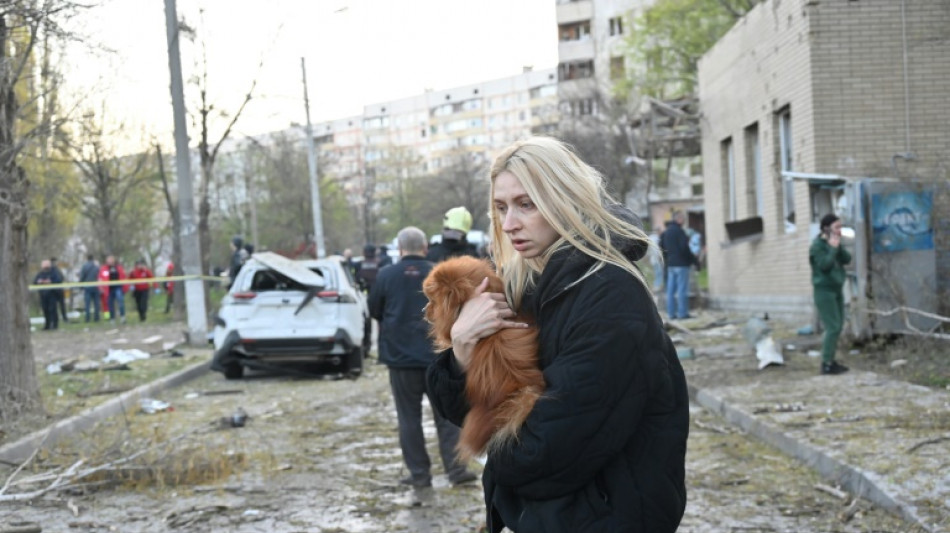
Russia says Ukraine energy truce over, US mulls peace talks exit

Russia said Friday that a 30-day pause on Ukrainian energy site strikes has expired, a step away from peace just as Washington threatened to exit ceasefire efforts if progress was not made soon.
US President Donald Trump has been pressing Moscow and Kyiv to agree to a truce, but has failed to extract any major concessions from the Kremlin, despite repeated negotiations between his administration and Russia on the three-year war.
One of the few commitments Trump had wrangled from Putin -- a temporary moratorium on striking Ukrainian energy infrastructure -- "expired" on Friday, Kremlin spokesman Dmitry Peskov said in response to an AFP question.
Neither side set up a mechanism for monitoring the moratorium and both sides routinely accused the other of breaking it.
"As of this time, there have been no other instructions from the Supreme Commander-in-Chief, President Putin," Peskov told reporters.
Moments earlier, US Secretary of State Marco Rubio said Washington needed to figure out soon whether a ceasefire was "doable in the short term".
"Because if it's not, then I think we're just going to move on," he told reporters at Le Bourget airport before leaving the French capital.
Russia kept up strikes on Ukraine unabated overnight, firing at least six missiles and dozens of drones at Ukraine, killing two people in the northeastern regions of Kharkiv and Sumy and wounding 70 others, officials said.
An AFP photographer in the city of Kharkiv witnessed the aftermath of one strike, which left rubble and debris scattered across a street.
An elderly resident could be seen bandaged, her face smeared with blood, while residents assessed the damage.
- 'Mockery' of our people -
Ukrainian President Volodymyr Zelensky slammed the attacks, which came just days before Easter.
"This is how Russia started Good Friday -- with ballistic missiles, cruise missiles, shahed drones. A mockery of our people and cities," he said on Telegram.
Russia said it had hit "key drone production sites" and Ukrainian military airfields.
Since taking office, Trump has embarked on a quest to warm ties with the Kremlin that has alarmed Kyiv and driven a wedge between the US and its European allies.
Putin last month rejected a joint US-Ukrainian proposal for a full and unconditional pause in the conflict, while the Kremlin has made a truce in the Black Sea conditional on the West lifting certain sanctions.
Trump has also repeatedly expressed anger and frustration at Zelensky in a marked break from policy under his predecessor, Joe Biden.
The United States is pushing Ukraine into a deal that would give Washington sweeping access to its mineral resources.
Ukraine's prime minister will visit Washington next week for talks with top US officials aimed at clinching the minerals and resources deal by April 26, according to a US-Ukraine signed "memorandum of intent" published Friday.
Trump wants the deal -- designed to give the United States royalty payments on profits from Ukrainian mining of resources and rare minerals -- as compensation for aid given to Ukraine under Biden.
- Witkoff on 'Russian side' -
France hosted meetings between US and European officials in Paris on Thursday, saying the talks had launched a "positive process".
The meetings included French President Emmanuel Macron, Rubio and US envoy Steve Witkoff.
European officials had expressed dismay at being shut out from the peace process, while Ukraine has expressed concern that Witkoff -- one of Trump's closest allies -- is biased towards Russia.
Zelensky accused Witkoff on Thursday of having adopted the "strategy of the Russian side", after the US envoy suggested a peace deal with Moscow hinged on the status of Ukraine's occupied territories.
"He is consciously or unconsciously, I don't know, spreading Russian narratives," Zelensky told journalists.
Witkoff told Fox News on Monday that a peace settlement depended on "so-called five territories" -- the Ukrainian regions of Donetsk, Lugansk, Zaporizhzhia, Kherson and Crimea, that Russia claims to have annexed.
The Kremlin wants its claims over the regions to be recognised as part of any peace deal, a proposal that Ukraine has balked at. Moscow does not fully control any of them except for Crimea, which it seized in 2014.
Beijing on Friday denied giving any party in the Ukraine war lethal weapons, after Zelensky claimed he had "information" China was supplying arms to Russia.
"The Chinese side has never provided lethal weapons to any party in the conflict, and strictly controls dual-use items," foreign ministry spokesman Lin Jian said.
T.Jeon--SG

 London
London

 Manchester
Manchester
 Glasgow
Glasgow
 Dublin
Dublin
 Belfast
Belfast
 Washington
Washington
 Denver
Denver
 Atlanta
Atlanta
 Dallas
Dallas
 Houston Texas
Houston Texas
 New Orleans
New Orleans
 El Paso
El Paso
 Phoenix
Phoenix
 Los Angeles
Los Angeles



